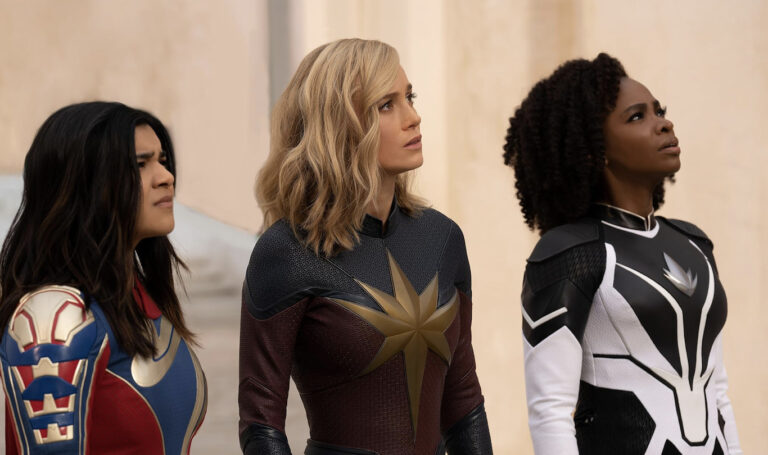
Marvel Studios is undergoing some serious soul-searching after the less-than-marvelous reception of its latest offering, titled (perhaps unaptly) The Marvels.
In the decade-and-a-half since its debut with Iron Man, the Marvel Cinematic Universe has behaved like a supernova, but the recent box-office receipts for The Marvels suggest the studio may have stumbled into a black hole, if not a red one.
The Marvels opened in North America the weekend of November 10-12, taking in a paltry $46.1 million, making it the least lucrative debut in the history of MCU, which has raked in more than $30 billion globally over the past fifteen years. Not since the release of The Incredible Hulk back in 2008 have the bean counters been so disappointed. Reviews and audience reactions have also been less than enthusiastic.
According to press reports, both Marvel Studios and Disney have acknowledged things have not been living up to expectations. Disney’s CEO Bob Iger was quoted as saying on November 8 that his studio had “lost focus” by putting an emphasis on quantity over quality. On the following day, Disney and Marvel announced they were cutting back the number of superhero films that would debut in 2024—reducing the number of planned releases from three to one, namely Deadpool 3.
Deadpool 3, by Shawn Levy and Ryan Reynolds, will open on July 26, nearly three months after its original release date in early May. The film, which co-stars Hugh Jackman as Wolverine, is the first R-rated movie to be released by Marvel Studios.
Also being postponed are Marvel Studios’ Captain America: New World Order and Thunderbolts. Originally slated for release on July 26, the Captain America film will now be delivered on February 14 of 2025. Thunderbolt, starring Florence Pugh and Sebastian Stan, is being delayed from Christmas week 2024 to July 25, 2025.
While the SAG-AFTRA writers’ strike has also been a factor in these postponements, industry sources also hint at a variety of explanations for the relatively poor showing by The Marvels. An unidentified film producer was quoted in The Hollywood Reporter as remarking: “Why not simply make Captain Marvel 2? Why produce The Marvels when your audience identified, empathized, and even hero-identified with Brie Larson’s character? More importantly, why offer people similar or the same characters and stories that are on Disney+ if you expect them to go to a theater together? Disney/Marvel diluted their product… Of course, a picture works or fails for other reasons too, but losing so much value picture-over-picture is rare and hard to do.”
Addressing these issues, Comscore’s box office analyst Paul Dergarabedian was quoted in the same article as saying: “the uneven performance of all superhero films in recent years should be a wakeup call in terms of how these films are conceived, executed, and marketed moving forward.”
.
Some observers have suggested that racism and misogyny may have played a role in the poor reception of The Marvels, which was directed by Nia DaCosta, a Black woman. Also, two of the movie’s leading characters are people of color, with critics lauding especially the performance of Pakistani-Canadian actress Iman Vellani in the role of Ms. Marvel. Teyonah Parris also gained notice for her portrayal of Monica Rambeau. Others debunk this explanation, however, pointing to the success of such recent films as Barbie and Wakanda Forever.
“Superhero fatigue” is a likelier factor at work here, say some observers, since other similar films in the genre have also turned in relatively lackluster performances, such as DC’s Shazam! Fury of the Gods, The Flash, and Blue Beetle as well as Marvel’s Ant-Man and the Wasp: Quantumania. Still, other superhero movies have been doing well, including Guardians: Vol. 3 and Spider-Man: Across the Spider-Verse.
Whatever the reasons, there’s little doubt that both MCU and Disney will be contemplating its options as they launch new projectiles into the galaxies.
Check out more of Edward’s articles

